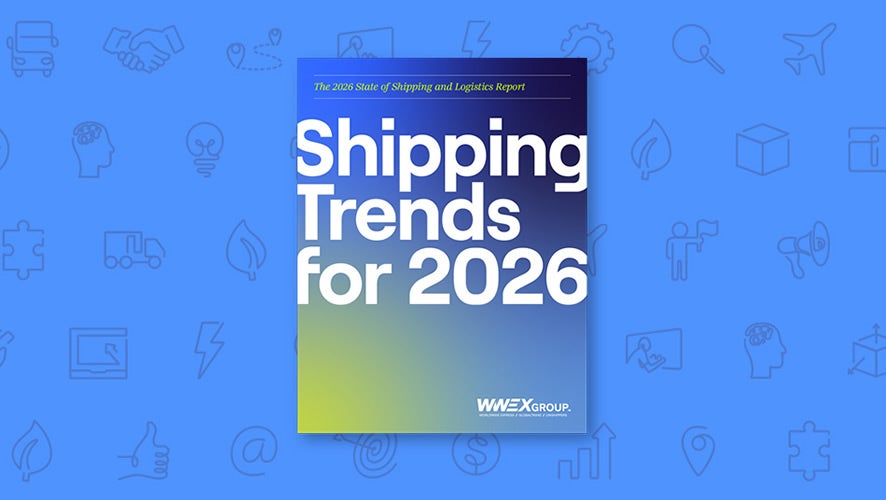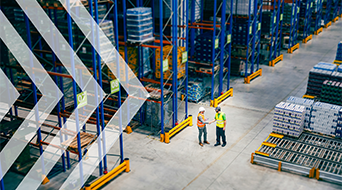BLOG POST
Freight Recession: We Debunk 4 Myths and Provide Tips on How To Survive It

Reading Time: 5 minutes
Chances are, as a freight shipper, you've been impacted by the current freight recession that has sent the shipping industry into a tailspin. As a result, you most likely have a lot of questions about what it means to you and how you can protect your business.
Below, Worldwide Express addresses some of the common myths that shippers just like you ask about regarding the freight recession. We also provide tips on what to look for in a shipping partner that can help you navigate the current turbulence in the shipping industry.
Myth 1: Freight Recessions Are Rare
A freight recession is a period of time where there is a significant decrease in demand for freight shipping services. These events happen more frequently than you might expect. Aside from the current freight recession we are experiencing, there were downturns in 2008 and 2019. In both cases, many freight carriers had to cut back and streamline operations in order to survive. With the recent closure of Yellow and Convoy carrier companies, this recession is turning out to be similar in nature to those in the past. This means shippers should expect freight recessions in the future and look for long-term solutions that will consistently help them through prosperous and turbulent times.
Myth 2: A Slow Economy Is To Blame for the Freight Recession
A slowing economy has certainly contributed to the current freight recession. However, most analysts point the finger at COVID. During the pandemic, consumer behavior changed since more people were stuck in their homes and ordered products like never before. It was a boon period for the freight industry. As a result, the marketplace was flooded with new carriers capitalizing on this new demand for freight services. It also meant carriers could raise freight rates due to capacity constraints. But since the COVID lockdown ended, consumer behavior has normalized to pre-pandemic levels, leaving an excess of capacity in the marketplace and carriers competing for loads.
Additionally, many companies overstocked their warehouses during COVID, believing pandemic consumer behavior was the new normal. Now they have more inventory than they can sell and don't necessarily need COVID-level freight solutions. This has left freight carriers fighting for every single bit of business.
Understanding the exact nature of the freight recession is complicated. Freight Waves provides a very detailed historical analysis that helps make sense of it all.
Myth 3: Freight Rates Are Lower During the Freight Recession
Currently, there is more freight capacity in the marketplace than there is demand. That simply means more trucks and carriers are competing for the same business and are offering rate levels that allow them to attract loads while keeping their doors open. It's highly competitive to say the least.
But remember, as mentioned earlier, rates were elevated during COVID, so it's not necessarily fair to compare now-versus-then rates. Regardless, finding ways to get the best freight rates and develop strong carrier relationships - whether during normal or turbulent times - is the best route for shippers to take for continued success.
Myth 4: The Freight Recession Is Almost Over
The short answer is that no one knows for sure when the freight recession will end. However, leading industry analysts predict that the second half of 2024 will see movement toward normalization, but still far from what we saw in the industry during pandemic times. CNBC published the results of a survey where they asked logistics experts for their predictions about how and when the shipping industry would recover. You can check it out here.
6 Things To Look for In a Shipping Partner During a Freight Recession
Working with an industry-leading third-party logistics (3PL) provider can help you navigate all turbulent times in the shipping industry, including the current freight recession. A top 3PL should be able to provide you with the following solutions to help you remain profitable, secure top freight rates and build carrier relationships for the long term.
Strategic shipping guidance
A top 3PL should have a long history of success in the shipping industry and provide assistance in streamlining every aspect of your shipping operations. That should include making recommendations for improvements all along your supply chain - whether it's freight shipping, procurement, technology or other solutions.
Financial stability
Unfortunately, many carriers and logistics companies are finding it difficult to stay profitable during the freight recession. Ask your potential 3PL about its financial stability and if they have invested in diverse shipping modes aside from standard freight - including international shipping, parcel service and multimodal freight - that helps them remain stable during turbulent times. After all, the last thing you need is to partner with a 3PL or carrier company that struggles during recession periods.
Technology investments
During adverse times, shippers like you need to maintain shipping stability, streamline operations and create long-term shipping strategies that will serve you well beyond the recession. Technology solutions are a major component in this task. In particular, a transportation management system (TMS) allows you to find trucks, compare rates, add insurance, control invoicing and monitor shipments with real-time shipping visibility. A top 3PL should be able to provide this platform, along with technology support to assist you.
Industry and carrier relationships
During a time when carriers are unfortunately going out of business, it's important to partner with a 3PL that has a large network of carriers on hand. In particular, a 3PL should give you access to a vetted network of less-than-truckload, full truckload and specialty freight carriers that can move your products quickly. They should also have deep relationships with these carriers and provide you with pre-negotiated rates that save you money.
Superb account management
In turbulent times, you need access to experts whenever you need help with your shipping - in real time. A top 3PL should provide elevated account management services that assist you with the simplest of tasks, along with those that may be related to larger issues like the freight recession. Account teams can help you navigate shipping strategy, technology, change in shipping solutions, pricing, carrier selection and so much more.
Industry analysis
It's hard to keep up with and make sense of the latest freight recession news. A top 3PL should be staffed with industry experts who live and breathe the latest news, numbers and outcomes from the shipping industry. In turn, they should also share this knowledge and provide context on what it means to you and your business.
Need an expert? Worldwide Express can help you navigate the freight recession.
Worldwide Express has more than 30 years of success in the logistics industry and helps thousands of shippers of all sizes move products with great efficiency. We are also part of the WWEX Group family of brands, these companies make up one of the largest and most diverse 3PLs in the industry, providing shippers with top solutions and financial stability that helps them succeed. Between our freight and parcel solutions, we service more than 108,000 plus customers, and have the resources and expertise to work with companies of all sizes in nearly every industry..
See how Worldwide Express can help you transform your freight shipping. If you are ready to talk to an expert, reach out for a free consultation today!





